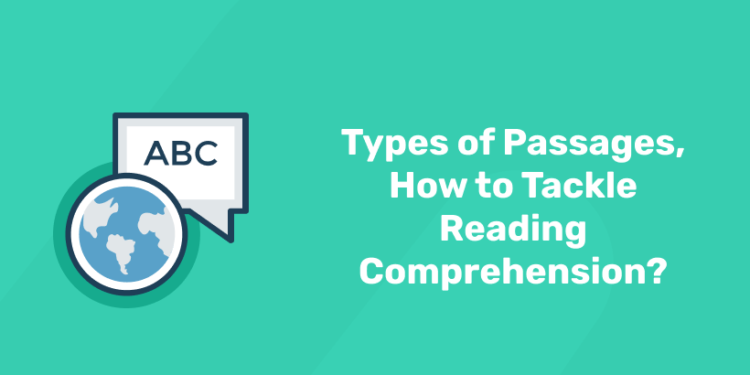Table of Contents
Reading comprehension questions are a tricky ball game in every competitive exam. Reading comprehension passages can be time-consuming, energy-sapping, and information intensive. On the other hand, the bonuses they offer are mesmerizing: if you learn a passage well, you should be able to get most questions in a single passage correct, and this implies you earn quite a few marks by solving one set of questions. At the best of times, you are likely to see a passage that you have never read previously. One of the most important factors for solving reading comprehensions and being factual in this area revolves around the approach you adopt for this topic. How you cope with such a challenge becomes a major aspect of how you perform in reading comprehension.
Check out this video by Entri in Malyalam!
Reading Comprehension – An Overview
Reading comprehension is the capability to comprehend or understand, what you are reading. This is an intended and active part of reading and takes place before, during, and after you read something. By being able to understand what you are reading, you can extract meaning from the text and better learn what the author is trying to convey.
There are two elements of reading comprehension: text comprehension and vocabulary knowledge. Vocabulary knowledge is the capability to comprehend the language being used, while text comprehension is using this language to invent an awareness of what the meaning is behind the text.
The Importance of Reading Comprehension
1: Which of the sentences below is grammatically correct?
Reading comprehension is essential for several reasons and can deliver many benefits. Being able to effectively read can enhance both your personal and professional life and can improve your overall enjoyment of reading. Knowing how to understand a text can help increase your knowledge in certain areas and help you learn new skills and information quickly.
Other benefits of good reading comprehension skills possess:
- Being capable to understand, analyze and respond to documents and written communication in the workplace
- Enhanced your ability to write clearly and effectively
- The ability to understand and engage in current events that are in written form such as newspapers
- Heightened ability to focus on reading for an extended period
- Better enjoyment of and inspiration to read
Spoken English Course for Guaranteed Confidence and Career Growth
Spoken English Course by Entri App: Enhance your communication skills, gain certification, and boost your career with confidence.
Join Now!Types of Reading Comprehension Passages
The various writing styles or types of Reading Comprehension differ from each other. It does rely on some aspects like structure, choice of words, expression, and complexity of language. Normally, Reading Comprehension passages present information in the following mentioned six writing forms:
- Narrative
- Descriptive
- Factual/Expository/Informative
- Argumentative/Persuasive
- Analytical
- Abstract
Now, let’s see how can you determine each writing style and create your Reading Comprehension strategy accordingly.
Want to Learn More About Spoken English? Download the ENTRI Learning App Now!
Narrative Style
To start with, the Narrative style of writing is one of the most comfortable to recognize since these passages are written in form of a story. The author plans to narrate some events or personal experiences through such passages. In other words, these passages would seem most enjoyable to read if you are a bibliophile! Novels, anecdotes, autobiographies, histories, etc. are mainly written in a narrative style. As you would learn, some of the most popular movies are based on best-selling narrative books. So, you can begin by reading the plot summaries of your favorite movies to get a glance at the narrative style of writing. After all, any narrative passage needs you to visualize the scenes and setting and understand the characters to connect with the plot. All you would direct to do is:
- Try to identify the main ideas articulated in the start, middle, and the last
- While reading the passage, try to drag the underlying message that the author wants to share through the story.
- Also, the tone of the author will help you comprehend the emotions he/she is going through while narrating the story. Both the direct and the indirect questions may be asked from these passages.
Descriptive Style
The next type of Reading Comprehension is the descriptive style of writing. As you would think, descriptive passages plan to describe a place, person, thing, or event in sumptuous detail. Such passages typically include a lot of adjectives, adverbs, and metaphors to paint a picture of that particular thing in the reader’s mind. Suppose you visit a famous tourist place, how will you explain the beauty of it? Here, you would require to adopt a descriptive style. Most tourist guides, journals, magazines, and poetry are written descriptively. While diving into descriptive RC passages, just hold a few things in mind:
- A good concept for such passages is to go through the questions before reading the passage. This will save time and enable you to spot the needed answers easily since most of the questions asked from these passages are direct.
- Do not get diverted by the figurative language used in the passage. Rather, try to stay attentive to understanding the contextual meaning and answer the vocabulary-based questions accordingly.
Factual Style
Another type is the factual form of writing. The goal of the factual style of writing is to impart information to the reader logically and objectively along with some facts and figures. Likely, such passages won’t engage you if you are not in the habit of reading newspapers. News stories, teaching manuals, research papers, and reports present information in a factual form. Well, if you are fond of cooking, then you would know that even recipe books are written factually. A great thought to master such passages is to begin reading news reports, which will finally help you in later phases also. While reading factual passages you should keep in mind:
- Facts and figures may lean to confuse you, so concentrate on the main points and intention of the passage. Here also, you are recommended to glance through the questions before reading the passage. This way, you will be able to make mental notes of the necessary information required to answer the questions.
- Most of the questions asked are direct and need you to identify the key points. g. key features of a scientific report/research.
Argumentative Style
A standard type of writing is an argumentative/persuasive style of writing. The author writes in an argumentative way to persuade the reader of certain beliefs and opinions concerning a subject. In other words, such passages cite examples, justifications, and facts to help a stand taken on the given topic. You must have come across advertisements that tend to affect you to buy some products or services. Well, most of them, advertisements, reviews, and complaint letters are written in a persuasive form. A good way to comprehend such passages is, to begin with reading newspaper editorials that sustain a particular point of view regarding the latest policies or events. You can ace such Reading Comprehension passages by:
- Understand the author’s point of view concerning the subject being discussed. This way you will also be capable to understand the implied information and answer ‘the author agrees/disagrees’ questions well.
- This style of writing often employs continuity words like ‘in the same way, likewise, additionally,’ These serve as a hand of the examples used by the author to justify his/her stand.
- The manner and organization of the passage also help to answer the indirect or inferential questions
Master English language with Entri. Join now!
| Download free PDFs on various aspects of the English language! | |
Analytical Style
A variant of the above-stated writing style of Reading Comprehension is an analytical form of writing. Unlike the argumentative form, the analytical style of writing gives arguments and examples for examining the topic from all angles. The distinction between the two is the way a group discussion differs from a debate. Suppose you are requested to tell the pros and cons of a particular product or decision, how do you explain it? Here comes the role of the analytical form of writing. You will be needed to present justifications in favor of as well as against the subject. Even movie reviews usually adopt an analytical style of writing. Some of the newspaper editorials, technical reports, and magazine articles analytically portray the given subject. E.g. any controversial court case is typically delivered in an analytical form of writing in newspapers. A good approach for such RC passages would be:
- Determine the central theme of the passage and the views built up around it.
- In these passages, you will often come across contrast words like however, nonetheless, despite, but, Such words are employed to present arguments and counterarguments on the given topic.
- Concentrate on the appropriate points and do not focus too much on minor details. You are probably to be asked inferential questions from such passages. So, try to develop your opinion while reading the passage.
- A good idea to master such passages would be to read about the latest experiences and discuss them among your friends to analyze from different aspects.
Abstract Style
The last type of writing is called abstract style. As the title states, the abstract style of writing is adopted in passages that deal with abstract topics like philosophy. An impressive example of this would be the fantasy books that we all have loved in our childhood days. Such passages do not express all the information explicitly. The abstract style of writing typically confines non-material concepts that may be represented symbolically. Why not begin with reading about some philosophical topics that engage you? An efficient method to deal with such passages would be:
- Look for the tone and construction of the passage to figure out the author’s message in the passage.
- Such passages may seem complex and demand a second reading to understand their essence and connotation.
Speak english like a native!
Tips to Tackle Reading Comprehension
While confirming that you hit a fine balance in this area, you must keep several things in your mind and ensure you do not fall into the common pitfalls. With regards to the approach you should adopt for reading comprehension, keep the following attributes in mind:
- Do not over-emphasize trivialities
Details are crucial but don’t be plagued with examples, illustrations, and so on. You just ought to get a hang of the main point and not the instances. Comprehending the overall flow and structure will enable you to analyze and answer the questions.
- Do not memorize
You do not require to memorize every word present in the passage. Understanding the flow, structure, and main attributes in the passage should be your focus. For factual or specific point questions, you can continuously re-read the passage.
- Do not read the passage first
Always, first, go through the questions and then the passage. This will qualify you to focus on the things you ought to look at in the passage. Concentrate only on the questions, and not on a particular answer option. A quick summary of the questions is adequate.
- Do not over-emphasize vocabulary skills for RCs
Having a powerful vocabulary is excellent however having Shakespearean vocabulary will not stop you from understanding the passage. So do not put yourself under pressure in this area, and while reading the passage, make sure that you understand the essence of the passage and do not get stuck on particular words.
- Do not expend time on RCs that you cannot comprehend at first
At times we come across a passage that we are not capable to comprehend. If you are struggling with one such passage in the exam, make sure you have the patience and courage to avoid such a passage. Concentrate on the ones that you can manage easily. Go back to the tough passage in case of absolute necessity.
- Do not think the right option would come from outside the passage
Any of the options that are out of scope is never the right answer. The correct answer is always based on the data given within the passage. Do not concentrate on any of the options that distract you from the passage.
- Make Notes
While reading obscure /abstract text, make sure you make some quick and brief notes for ready reference. You can write the general flow, structure, paragraph-wise flow, and critical points. Remember that you do not have to make long notes, just make a quick note of the vital markers/points in the passage.
- Try to pre empt questions
This is a really hard skill but if you can master this, you will surely be the ‘King of Reading Comprehensions’. While reading the passage, try to pinpoint the possible questions that could be asked, and which parts of the passage seem the most likely contenders for question-setting.
- Opening and Closing paragraphs need extra focus
Questions such as the central idea question are based on the overall subject of the passage, and the majority of the time the answer for this question style lies in the first and last paragraph of the passage. Confirm you emanate the maximum possible information from these paragraphs.
Conclusion
The above form some of the basic points that should be kept in mind while approaching reading comprehensions in exams. Hope these would enhance your focus, expand your grasp of the subject matter and deliver greater understanding. If you perform these, your task is more or less done. Like these notes, you can also practice and learn such notes and activities in our learning platform ENTRI Learning App.
Spoken English Course for Guaranteed Confidence and Career Growth
Spoken English Course by Entri App: Enhance your communication skills, gain certification, and boost your career with confidence.
Join Now!Frequently Asked Questions
What are the common types of reading comprehension passages?
Reading comprehension passages typically fall into several categories:
-
Fictional Passages: Narrative stories focusing on characters, settings, and plots.
-
Scientific Passages: Texts that discuss scientific concepts, experiments, or discoveries.
-
Historical Passages: Excerpts detailing historical events, figures, or periods
-
Social Science Passages: Discussions on societal issues, politics, or economics.
-
Literary Passages: Excerpts from literature that may include poetry, prose, or plays.
How should I approach reading comprehension questions?
The blog suggests a strategic approach:
-
Read the Questions First: Skim through the questions before reading the passage to know what information to focus on.
-
Don’t Memorize: Aim to understand the general flow and main ideas rather than memorizing every detail.
-
Avoid Overemphasis on Vocabulary: Don’t get stuck on unfamiliar words; focus on understanding the overall meaning.
-
Skip Difficult Passages: If a passage is too challenging, move on to the next one and return to it later if time permits.
What are some common pitfalls to avoid?
To enhance comprehension and efficiency:
-
Overemphasizing Trivialities: Focus on the main ideas rather than getting bogged down by minor details.
-
Memorizing Details: Understanding the structure and flow is more important than memorizing specific facts.
-
Reading the Passage First: Instead, read the questions first to guide your reading of the passage.
-
Overemphasizing Vocabulary Skills: A strong vocabulary is helpful, but don’t let unfamiliar words hinder your understanding.
-
Spending Too Much Time on Difficult Passages: If a passage is too complex, move on and revisit it later if necessary.











